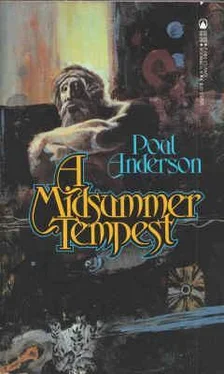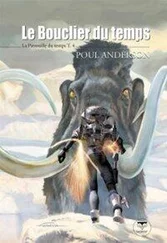Poul Anderson - A Midsummer Tempest
Здесь есть возможность читать онлайн «Poul Anderson - A Midsummer Tempest» весь текст электронной книги совершенно бесплатно (целиком полную версию без сокращений). В некоторых случаях можно слушать аудио, скачать через торрент в формате fb2 и присутствует краткое содержание. Год выпуска: 1984, ISBN: 1984, Издательство: Tor, Жанр: Фэнтези, на английском языке. Описание произведения, (предисловие) а так же отзывы посетителей доступны на портале библиотеки ЛибКат.
- Название:A Midsummer Tempest
- Автор:
- Издательство:Tor
- Жанр:
- Год:1984
- ISBN:0-812-53079-9
- Рейтинг книги:3 / 5. Голосов: 1
-
Избранное:Добавить в избранное
- Отзывы:
-
Ваша оценка:
- 60
- 1
- 2
- 3
- 4
- 5
A Midsummer Tempest: краткое содержание, описание и аннотация
Предлагаем к чтению аннотацию, описание, краткое содержание или предисловие (зависит от того, что написал сам автор книги «A Midsummer Tempest»). Если вы не нашли необходимую информацию о книге — напишите в комментариях, мы постараемся отыскать её.
A Midsummer Tempest — читать онлайн бесплатно полную книгу (весь текст) целиком
Ниже представлен текст книги, разбитый по страницам. Система сохранения места последней прочитанной страницы, позволяет с удобством читать онлайн бесплатно книгу «A Midsummer Tempest», без необходимости каждый раз заново искать на чём Вы остановились. Поставьте закладку, и сможете в любой момент перейти на страницу, на которой закончили чтение.
Интервал:
Закладка:
It was a low little thing, huddled beneath its thatch as if for warmth. Smoke blew on a streaking wind, out of a crude clay chimney, past leafless trees and over bare earth. The day was clouded to shadowlessness.
Into that gray and brown Sir William Fairweather came like a fire. A few pigs and chickens, loafing about the courtyard which house and outbuildings made, scattered from his charger. He sprang onto frozen mud, flung reins across hitching post, and caroled: “Halloo, my kiddies! Heare be your daddy come!”
Small forms boiled forth, to roil and pipe around him. He hugged them, lifted the two least onto his shoulders, and strutted toward the door.
It opened. A large woman, in drab and patched gown, appeared. For an instant she drew breath; tears started forth. Then at once she put arms akimbo and glared. “Why, good day to thee liake-wise, Nell,” he said through a weak smile.
“An’ what’s good about it?” she demanded.
“Look. I be hoame. No hurried visit for to let thee know I war zafe, but hoame from London an’ everywhere.”
“Until thy next gadabout!” his wife snorted. “What’ll thic be? This night a raid on tha coneys? Or a fearless foragin’ to tha Boar’s Head? Nay, no moare, Will Fairweather! Thou’st filled thy belly planty long in town; an’ I’ll waeger that ben’t all thou’st filled, either. Meanwhiale, tha roof went leaky, the peat undug an’ uncarted, I must zell our plowhoa’se for to pay tha plowman’s waeges—an’ dost thou bring hoame another? Nay, behoald yon evil-eyed keffel o’ thine! Bring him near any useful work, an’ ’a’ll shy as fast as thee; or else’ll kick tha whippletree to fierewood, though thic’d at least be moare than thou canst bestir thyzelf for to provide. Out o’ them fanciments! Lay down thy snickersnee. Take honest smock an’ pitchfork, an’ get tha barn cleaned. Else never await a bowl o’ what mush we can affoard for zupper, scant thanks to thee!”
“But—but—but, my dear,” he stuttered, “zee, heare at my belt, a purse full o’ goald. We’ll dine on beef an’ caepon tonight—”
“Not if thou ridest to market after them.”
“An’ as for leaks in tha roof an’ zuch, why, we’ve an estaete comin’, zoon’s title gets cleared. Doesn’t thou understand? I be maede kniaght. I’ll be tha new squiare. Let them poachers bewaere!”
“Humf. Indeed? Zo I must learn la-de-da manners, have tha vicar’s wiafe in weekly for tea, go pass Christmas baskets out’mongst tha smelly parish poor?’Tis fiane for thee to swagger’round twirlin’ thic tomcat mustache thou’st grown, aye, aye. But woman’s work be never done.”
After a moment: “Ah, well,” Nell finished, and spread her arms,”’twar a drab dworld without thee, oald gib, an’ I’ll not ask how many drabs thou didst fiand in thiane. Come in an’ dwarm thee; I’ve zaved an evenin’s dworth o’ yale; go thou ahead, whet on me tha lies thou’ll forever hence be stickin’ to thy bousy companions… Hoald! Wipe thy web feet, ninny!”
Forest stood everywhere around, black save where gleamed an icicle or the eye of an owl. The hill, though, rose clear, one glow and glitter of snow under a full moon and so many stars that darkness itself seemed crowded out of heaven. Air lay crystalline still and cold.
Tethering their horses, Rupert and Jennifer climbed to the top. She shivered. He brought an arm and a part of his cloak around her shoulders. “Art chilly, dearest?” he asked. His voice was lost in ringing silence.
She snuggled. “Never next to thee.”
“I likewise. But let’s do this final duty as quickly as may be, and hasten back to where men dwell. We’ve known sufficient strangeness. Now that we have been wed, I fain would clasp a sweet reality, too good for dreams.”
Rupert raised the staff he bore, she the book. Silver flashed on their hands. “King Oberon and Queen Titania,” he said louder, “this one last time we call you forth to us. By the moon’s witchery, in Yuletide season whose joyousness foretells a year reborn, come out to claim what rightfully is yours.”
A glow awoke, and the rulers of Faerie stood before them. A new majesty, or an old one returned, made the humans bow very deeply.
Yet the queen’s words sang mild: “Greeting, good Rupert, gentle Jennifer. How happy’tis to welcome you again.”
“More than your kin, the Half-World owes you thanks,” Oberon said. “Ye have lit countless candles in a shadow. What luck and love may lie within our gift we promise you, each night ye both do live. And when at last your Father bids you home, ever shall elven songs remember you, ever shall springtime garland your graves in blooms, ever shall fortune follow your children’s children, as long as kindly magic does endure.
May it not fail before the Judgment Day.”
“We thank you too, and most sincerely hope”—Rupert hesitated, shook his head—“though I know not—know not—and cannot know—” Straightening: “It hurts that we must make a severance. But we’re too much of flesh, my bride and I, and too much mortal world and work await. These eyes are blind to color by the moon; these heavy ears hear birdsong but are deaf to thin delirious music of the bat; these fingers are too coarse for harvesting of dewdrops or for weaving spider-silk; these nostrils drink no odor from a stone; these tongues can find no taste in thistledown. So we’ll no longer tread in Faerie’s rings or follow its wild stars beyond the wind. We’ll seek what wonder is in common earth.”
Jennifer seized the queen’s hand. “I think you also always will be there,” the girl said. Titania smiled.
“Take back the serpent sigils that you gave,” Rupert told Oberon. “Someday, maybe, you’ll find a man with strength to keep that flame—”
“Or with less blood than thine,” Jennifer interrupted him. “I’ll see thou’lt never wish for more than me!”
Amusement went mercurial across the kingly pair. Rupert continued doggedly: “Likewise take off the book and staff we bear, old Prospero’s, to keep where seems you best. Greet Ariel from us.”
“And Caliban,” Jennifer murmured. “And… there’s a lad—no cause for jealousy—your Majesties must know whom’tis I mean—If sometime soon, along some twilit land, he might meet one who has a heart to swap… And oh, I know so many more besides—”
“Dear girl, we cannot ward the living earth,” Oberon answered, grave again and softly, “no more than can the rivers, hills, or sky. That loneliness is laid upon thy race.” He and his queen gathered the things of sorcery. “Fare always well.” He raised the staff. “Titania, away!”
They were gone into the radiant winter night After a long while, Rupert took Jennifer’s arm and said “Come, darling, let’s get home before the day.
Epilogue
They were many gathered this evening, to sit before the innkeeper’s fire, enjoy his food and drink and regale him with their tales. Valeria Matuchek leaned against the bar, a pint in her fist, the better to oversee them. A few she recognized, or thought she did—brown-robed monk at whose feet lay a wolf, gorgeously drunk Chinese from long ago whose calligraphic brush was tracing a poem, rangy fellow nearby whose garb was hard to place but who bore a harp, large affable blond man in high boots and gray leather with an iridescent jewel on his wrist, lean pipe-smoking Victorian and his slightly lame companion, wide-eyed freckle-faced boy and Negro man in tatterdemalion farm clothes, coppery-skinned feather-crowned warrior who held a calumet and a green ear of maize—but of the rest she was unsure. Several were not human.
Читать дальшеИнтервал:
Закладка:
Похожие книги на «A Midsummer Tempest»
Представляем Вашему вниманию похожие книги на «A Midsummer Tempest» списком для выбора. Мы отобрали схожую по названию и смыслу литературу в надежде предоставить читателям больше вариантов отыскать новые, интересные, ещё непрочитанные произведения.
Обсуждение, отзывы о книге «A Midsummer Tempest» и просто собственные мнения читателей. Оставьте ваши комментарии, напишите, что Вы думаете о произведении, его смысле или главных героях. Укажите что конкретно понравилось, а что нет, и почему Вы так считаете.











